#MLK advocated for nonviolent resistance
Text
on Martin Luther King Jr. day, here's a reminder of his words penned from the interior of a Birmingham, Alabama jail in 1963:
“I have almost reached the regrettable conclusion that the Negro’s great stumbling block in the stride toward freedom is not the White Citizens Councilor or the Ku Klux Klanner but the White moderate who is more devoted to ‘order’ than to justice.”
while liberals and self-proclaimed moderates will flock to social media today to post their MLK quotes and laud the achievements of Dr. Martin Luther King Jr., it's important to keep in mind that Dr. King wasn't always popular with the average american. in the 1960s, public opinion was mixed until around 1966 when his popularity fell off a cliff.
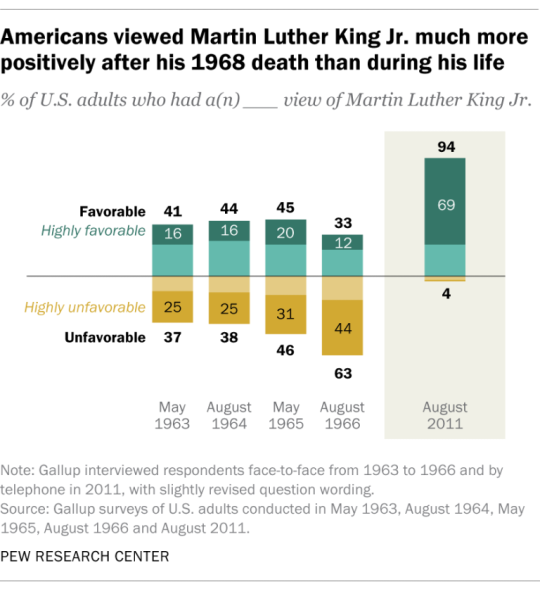
and despite his starkly positive posthumous approval rating, one could argue that Dr. King would not be nearly as popular today if he was still among the living.
King was a strong critic of the Vietnam War and a fierce advocate for labor rights. he spent time in jail, was being followed by the FBI, was charged with having communist sympathies despite his outspoken criticism of the communist party, and was adamantly opposed to poverty and wealth disparity - he actually believed in a guaranteed income. in the modern world, he would not be praised for holding these views.
we do a disservice to Dr. King's legacy and all that he worked for when we choose to celebrate a sanitized version of him that is full of quotes taken out of context and nebulous ideals about peace and harmony; yes, he supported nonviolence when possible. however, as with everyone, his views and convictions changed and evolved with time. his notions about what constituted "resistance" were complex, disruptive, and often culminated in violence by those on opposing sides. furthermore, Dr. King was a staunch opponent of capitalism and the type of society that it creates.
when we celebrate Martin Luther King Jr Day, we celebrate the ideals that he championed. that includes the views that many people find scary and "radical" in today's world.
676 notes
·
View notes
Text

By: Ron Kapeas
Published: Jan 8, 2024
JTA — In a speech marking Martin Luther King Jr. Day weekend, Rep. Ritchie Torres likened protesters who have celebrated Hamas’s October 7 massacres to white people in the Jim Crow era who celebrated after the lynching of Black people.
“I was profoundly shaken not only by October 7, but by the aftermath,” Torres, a Black Bronx Democrat, said Friday in a speech at Central Synagogue, a prominent Reform congregation in midtown Manhattan. “I found it utterly horrifying. To see fellow Americans openly cheering and celebrating the deadliest massacre of Jews since the Holocaust. And for me, the aftermath of October 7 revealed a barbarity of the American heart that reminded me of an earlier and darker time in our nation’s history, a time when the public mobs of Jim Crow would openly celebrate the lynching of African Americans.”
Protests have proliferated since October 7, when Hamas terrorists murdered some 1,200 people, kidnapped around 240 and brutalized thousands more in an invasion from Gaza. They have grown as Israel has waged a war in Gaza to eliminate the terror group, and especially as casualties mounted: So far, close to 25,000 Palestinians have been killed, according to the Hamas-run Gaza health ministry, which does not differentiate between fighters and non-combatants and is also believed to tally civilians killed by errant rockets fired by terror groups.
A number of the protests have decried the October 7 violence on Israelis, but others have skated over the initial massacres or have embraced Hamas and described its atrocities as resistance.
Torres, a member of the progressive caucus in Congress, has garnered a reputation as an unstinting supporter of Israel. He has duked it out online with fellow progressives in debates over Israel, a dynamic that has only intensified since October 7. Torres is heavily funded by AIPAC and donors aligned with the pro-Israel lobby, and spoke at a massive rally for Israel in Washington on November 14.
In his speech, Torres alluded to the controversies that assailed elite universities after the presidents of Harvard, the Massachusetts Institute of Technology and the University of Pennsylvania told Congress that calls to commit genocide against Jews did not necessarily violate the schools’ codes of conduct. The ensuing uproar drove Harvard’s and Penn’s presidents to resign.
“What we’ve seen in the aftermath of October 7, is appalling silence and indifference and cowardice from so called leaders in our society from institutions that we once respected and admired,” he said. “And if we as a society cannot bring ourselves to condemn the murder of innocents with moral clarity, then we must ask, what are we becoming as a society? What does that reveal about the depths of antisemitism in the American soul?”
I had the honor of delivering the annual MLK sermon at Central Synagogue.
My speech touches on a range of topics and themes: October 7th, Jim Crow, Leo Frank, MLK, Elie Wiesel, silence, indifference, moral clarity, nonviolence, Israel, Am Yisrael Chai, Hatikvah, and hope. pic.twitter.com/stxqxzgyLi
— Ritchie Torres (@RitchieTorres) January 16, 2024
Central is a locus for some of the city’s wealthiest liberal Jewish families, many of whom are also firm supporters of Israel. Dr. Shonni Silverberg, the synagogue president, introduced Torres as a champion of progressive priorities as well as an advocate for Israel, and noted that he is the first openly LGBTQ representative elected from the Bronx.
“Ritchie remains steadfastly focused on the priorities of his South Bronx constituents, expanding access to safe and affordable housing, rebuilding New York economically and ensuring that no child goes hungry and that all receive a good education,” she said. “But he has also shown himself both in and out of Congress to be a great friend of the American Jewish community and Israel.”
--
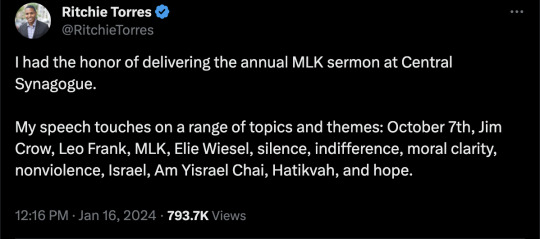
==
I was shocked, but not surprised. Shocked at how openly, how loudly and how quickly pro-Hamas, pro-terrorism supporters emerged from their Postcolonial Studies, Gender Studies, Intersectional Feminism Studies and other fraudulent sewers in the ivory towers long before Israel ever fired a shot back.
I was not surprised, however, since antisemitism is a cornerstone of Intersectionality, as I posted about more than two years ago:
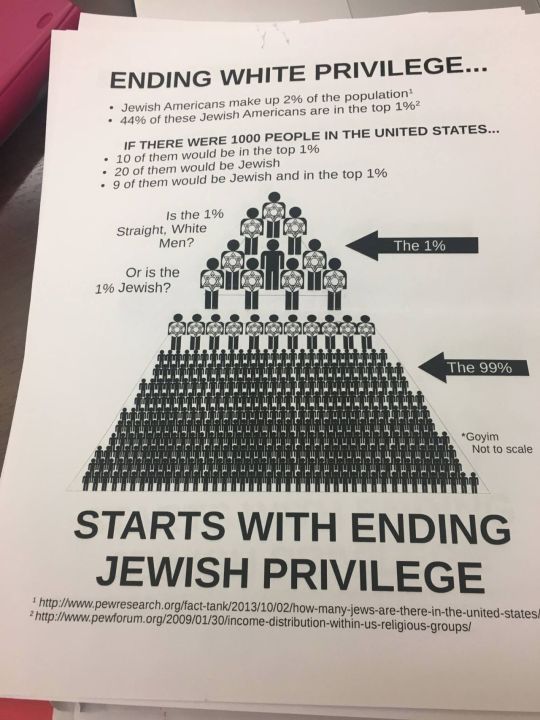
I naïvely expected that they'd go, "whoa, we didn't mean it like that, that's not what we were after," the standard No True Scotman tactic to distance their enlightened antisemitism from the antisemitism of murderous Islamic jihadists.
But they went the other way and leaned into it, cheering it on, while others tried to gaslight everyone with the usual array of denials that they weren't saying what they were openly saying, and that anyway, if they were saying it, that's not what they meant.
#Ritchie Torres#MLK Jr Day#MLK Day#Martin Luther King#Martin Luther King Day#Martin Luther King Jr Day#islamic terrorism#hamas#hamas supporters#pro hamas#pro palestine#pro palestine is pro hamas#antisemitism#October 7#Oct 7#hamas massacre#october 7 massacre#exterminate Hamas#religion is a mental illness
21 notes
·
View notes
Text
Dancette 7: a figure that I am inspired by is MLK. He worked for social justice through nonviolent resistance by being an advocate for peaceful protests through the American civil rights movement. He inspired a significant societal change through his leadership and inspired shifts in societal attitudes towards racial equality. His actions, values, and traits represent him as a person who cared for the world around us and wanted everyone to be cared for and loved as one. I embodies this through my dancing by having free flowing movements to represent the change and love that MLK brought into the world. Although not all of these problems are completed gone today, his legacy has lived on and prevails day to day.
0 notes
Text
AMERICAN HISTORY FINAL ESSAY
it so fucking happening. we are so 🔛🔝!!!!!!!!!!!!
CAN WE GET MUCH HIGHER???????????
SO HIGHHHHHHHHHHHHHHHHHHHHHHHHHHHHHHHHHHHH

ANYWAYS THE PROMPT: Explain the evolution of the Civil Rights movement into Black Power and Black Nationalism.
The Civil Rights Movement rose around the 1950s with the goal of equality for African Americans. It aimed to end racial segregation and discrimination around the United States, and claim equal rights for Black Americans. The movement ran mostly from 1950 to the 1960s, and through that time it made significant milestones, such as the bus boycotts and legislative actions. Famous figures were also born, like Martin Luther King and Malcolm X. However as time progressed, there was a shift in the movement. As tension and frustration grew among the people over their limitations, there was a shift toward a new revolutionary movement that embraced Black Power and Black Nationalism. In pursuit of racial equality, they expanded beyond the goal of just desegregation and aimed for black autonomy in the face of oppression and discrimination.

As mentioned, the movement ran through the 1950s and the 1960s. Within the 1950s of the Civil Rights Movement, it had achieved milestones such as desegregation in schools and legislative action. But by now, many of the activists were now middle-aged. New members wanted faster changes and their methods of protesting became more confrontational. In the 1960s rose the organization, SNCC, the Student Non-Violent Coordinating Committee. It was a group that would "push the civil rights movement in a new, more confrontational direction (American Yawp 27)" while still maintaining a nonviolent principle. However, that would soon change when figures like Stokely Carmichael came to power.

The SNCC began transitioning away from its original ideals and began to embrace Black Power, as well as Black Nationalism; a belief that centered on maintaining a separate identity and self-reliance. This was largely influenced by Malcolm X, a minister of the Nation of Islam (NOI). His speeches largely encouraged the pursuit of "freedom, equality, and justice by “any means necessary (American Yawp 27)." He was also an advocate for "armed resistance in defense of the safety and well-being of Black Americans (American Yawp 27)." and stated, “I don’t call it violence when it’s self-defense, I call it intelligence (American Yawp 27)." His call for action to achieve the goals of equality went directly against MLK's agenda, who saw his speeches as a disservice to Black Americans. Ultimately, the clash in ideals represented the changing atmosphere in politics and the Civil Rights movement. As new activists rose from the old, came new ideas.

Among the SNCC organization, members were becoming dissatisfied with the slow progress brought by nonviolence. Inspired by Malcolm X, they began to turn to Black Power, a movement that focused more on self-reliance and determination rather than integration. It was a "more aggressive movement (American Yawp 27)", that "called for African Americans to play a dominant role in cultivating Black institutions and articulating Black interests rather than relying on interracial, moderate approaches (American Yawp 27)." In contrast to the Civil Rights Movement, Black Power encouraged the use of violence in self-defense and to achieve freedom, justice, and equality by any means necessary.
During a march on June, 1966, Carmichael coined the slogan that would define the movement, “What we gonna start saying now is black power (American Yawp 27)!" The phrase 'Black Power' resonated with audience and would represent the movement, as well as directly clashing with MLK's 'Freedom Now.' Although it can be interpreted differently, it's overall message emphasizes self-determination for black community politically, economically, and socially. Alongside Black Power came Black Nationalism, a movement with a similar goal for equality and empowerment for the Black community with an emphasis on unity and autonomy, as well as separatism. This can be seen in the expulsion of white members from the SNCC. "By the late 1960s, SNCC, led by figures such as Stokely Carmichael, had expelled its white members and shunned the interracial effort in the rural South, focusing instead on injustices in northern urban areas (American Yawp 27)." Slowly, organization within the movement was moving away from the idea of desegregation to focus solely on their people.

me strugglign to keep going because im sooo hungry ahhh
The Black Panther Party was a large part of the era for Black rights and is an example that embodies both of these ideals. Formed in 1966 by Huey Newton and Bobby Seale in Oakland, California, the party was known for being a uniformed group and for Black Nationalist beliefs. Most often the group is seen and remembered as 'violent', likely due to their open display of firearms and weapons, being "the standard-bearers for direct action and self-defense (American Yawp 27)." They were known for protecting black citizens from brutality, mostly from police. The fear around the Panthers went as far as them being called the 'greatest threat' to international security. However, there was more to the group than just self-defense. "...the party’s 10-Point Plan also included employment, housing, and education. The Black Panthers worked in local communities to run “survival programs” that provided food, clothing, medical treatment, and drug rehabilitation (American Yawp 27)." Beyond direct action, the group was known for helping out local communities. They provided resources for those in need, from opportunities to supplies. Not only were they focused on having militant power, but they also focused on equity for Black Americans.

The goal of the Civil Rights Movement was the pursuit of equality and equity for Black Americans. For the most part, it was largely influenced and led by a nonviolent approach that would allow for integration. Yet as time went on, activists' views shifted and introduced other conflicting ideologies. This included Black Power and Nationalism, two ideas that had the same goals but different approaches. Instead, they proposed using violence and separatism. Change was only inevitable within the movement as people grew impatient with the rate at which it was moving, and to achieve their goals, they turned to more confrontational and action-based ideas.
0 notes
Quote
A riot is the language of the unheard.
Martin Luther King, Jr.
#inspiration#MLK advocated for nonviolent resistance#he said that violent resistance would not be as potent as nonviolence in effecting change#but he I think rightly pointed out that the very fact that riots occurred in his day was because peoples needs were being ignored
10 notes
·
View notes
Text
I don’t think anyone in their right mind would side with the police who killed George Floyd on monday. At least anyone who has any fragment left of their moral compass. What happened that day was despicable and it’s not the only time something like this has happened. Far from it...
I, like many others, have been silent about events, possibly because we don’t think we can do anything from our corner of the world here in Aotearoa. I reflect on the words of Martin Luther King as he said “There comes a time where silence is betrayal.” Words such as this are harsh, but hold its weight after many years and rings ever true today. I hope that I can be more vocal, more active despite the physical distance between me and where these actions take place. I think it will be a juggle to know what to speak up about and what not to. There’s always injustice happening in the world whether it’s from proxy wars, sex trafficking, slavery, and systems that oppress the already downtrodden. I think knowing this always made me feel overwhelmed, like if i were to speak up about everything then I’d have little focus to begin to navigate my own path and address my own demons.
I’ve always had a sense of respect and admiration for those who despite all odds, had their voice heard, protested peacefully, and sparked change during their time and long after. King Tawhiao, the people of Parihaka, Martin Luther King, and Rosa Parks to name a few. Advocating for the destruction of livelihoods in a community as a remedy for years of little to no action taken against minority communities isn’t a valid or a moral argument. I say this because I side with MLK as he said:
“What I’m say’n is this, I want all of us to believe in non-violence but I’m here to say tonight that if every negro in the united states turns against non-violence, I’m gonna stand up as a lone voice and say this is the wrong way.”
“The Other America" Speech by
Rev. Martin Luther King, Jr. Grosse Pointe High School - March 14, 1968
He also spoke about his speech during an interview with 60 minutes:
“I will never change in my basic idea, that non violence is the most potent weapon available to the negro in his struggle for freedom and justice. I think for the negro to turn to violence would be both impractical and immoral.”
60 Minutes - September 27, 1966: MLK—A riot is the language of the unheard
I could be wrong in not jumping on the bandwagon of advocating for civil unrest and violence. But if I’m wrong, so are the many who have gone before us who were world-changers via nonviolent resistance. Yes the argument can be made that it’s been too long, there have been too many instances of injustice, murder, and death, there must be justice! Yes, there must be justice. I agree. It has been too long. But in my opinion not at the expense of the livelihoods of those in the Minneapolis community.
32 notes
·
View notes
Photo
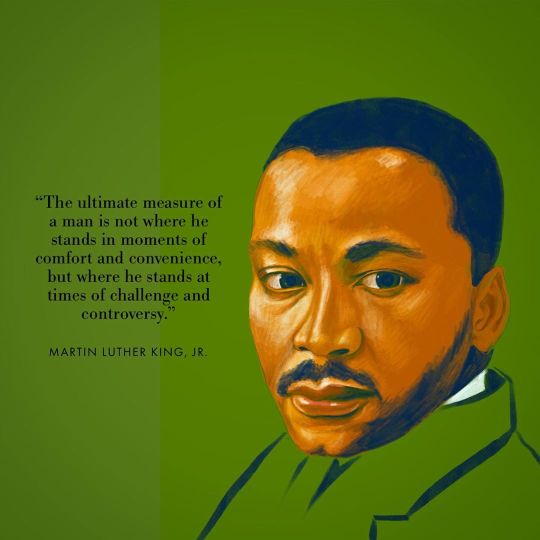
13/30: Dr. Martin Luther King, Jr. Can’t do a series of portraits of Civil Rights leaders without MLK. The single most iconic figure in American civil rights history, MLK was a charismatic speaker, a fearless leader, and the figurehead of the civil rights movement of the 1950s and 1960s. He led the 1955 Montgomery bus boycott, the 1963 protests in Birmingham, helped organize the 1963 march on Washington, where he delivered his famous “I Have a Dream” speech. He was awarded the Nobel Peace prize in 1964, and helped organize the Selma to Montgomery March in 1965 (the march that John Lewis also participated in). Like Fred Hampton, he was a subject of the FBI’s COINTELPRO surveillance. He was assassinated in 1968. Popular culture presents him as exclusively a proponent of nonviolence. But he advocated just as strongly for civil disobedience and wrote one of his most famous essays from his cell in an Alabama jail after he was arrested during a march for voting rights and desegregation. And like Fred Hampton, were left to wonder what might have changed in our country if Dr. King hadn’t been killed. His legacy inspires generations of activists and protesters, who continue his fight. . . Master list of the ways you can help today’s civil rights fight: https://linktr.ee/NationalResourcesList . . #martinlutherkingjr #mlk #protest #goodtrouble #activist #leader #icon #nonviolence #courage #civildisobedience #inspiration #civilrights #stories #inspiring #portraits #illustration #blacklivesmatter #peacemaker #selfdetermination #resistance #hero #american #story https://www.instagram.com/p/CBZ8YrPJeaX/?igshid=279use1r6u7e
#martinlutherkingjr#mlk#protest#goodtrouble#activist#leader#icon#nonviolence#courage#civildisobedience#inspiration#civilrights#stories#inspiring#portraits#illustration#blacklivesmatter#peacemaker#selfdetermination#resistance#hero#american#story
0 notes
Link
A topic of discussion during the presidential election is whether Americans and the presidential candidates can honor our Constitution while also staying true to the faith we profess.
The First Amendment to the Constitution states support of religion. This Amendment allows citizens the right to the religious practices of their own choice without government interference. The article speaks about if citizens that profess faith can they talk about those value of faith on stage during the presidential campaign.
Holy texts talk a lot about religion and separate politics. The article explains how it is a common thought that God-loving people live in groups to make decisions for a good life for everyone. So that means even for candidates to make the right decisions based on what religion they believe. In Christianity, the Hebrew Bible talks about the two things, politics, and religion, at once and distinguishes what they mean together and how they be should be acknowledged. Political leadership is a common topic in the Hebrew Bible and also political symbols like a canon, which can be seen as monarchy, tribal federation, and rule by prophets. This Bible advocates that individuals should seek to care for the poor such as stated “widow, the orphan, and the stranger.” In Exodus, it says, “You shall not wrong or oppress a resident alien...You shall not abuse any widow or orphan.” As political leaders mention they are religious and speak of their faith, do their actions and discussions demonstrate their faith? And if not, should politics and religion be separated because they can’t act on their word?
Moses, in the Hebrew Bible, can be characterized as a political figure when he negotiates with the Pharaoh to free the Hebrew refugees in slavery, although he acts using threatening demeanor. Many other well-known names in the Bible, like Isaiah, Jeremiah, Ezekiel, and Micah, demonstrate standing up for what is right and don’t ignore justice while standing up to those who are unmerciful.
The article continues to mention figures not just in the Bible that spoke the word of Jesus and the Bible but also a 20th-century prophet, Martin Luther King Jr. MLK used nonviolent resistance as Jesus did. The minister and activist spoke about liberty, unjust laws, and pursuit of happiness for all people regardless of their religion.
I believe in the Bible, and the message is clear and understanding when it comes to politics and religion interrelating. Individuals who speak of their faith should demonstrate that in their actions and what they believe in politics. Having faith speaks in both voices and works, no matter if it is politics and on-stage for an election. Politics and religion is a controversial discussion because of the main reason for the confrontation of not doing what is right and what is wrong. If we believe we are doing the right thing according to our faith; then, it should be affirmed by others too. Politics brings either people together or apart, and when religions believe in different things, also, no wonder people don’t agree in politics. It is another controversial topic to bring into the discussion when talking about presidential candidates and if they believe in what a citizen believes. Not everyone is going to agree on everything; therefore, not everyone is going to agree about how one religion believes and how one person votes or how someone believes in specific laws.
0 notes
Text
how incredibly privileged and sheltered do you have to be to think that when dealing with a group of people that wants you dead, a government/media that allowed them to rise to power, our priority is “seeming to be in the right” to “impartial observers”??? first of all if someone is “impartial” about fucking nazis they’re wrong, period, and will never do anything tangible to support human rights. i mean shit they can’t even condemn fucking nazis. second of all who is still under the impression that violence isn’t an effective way to keep nazis from becoming more powerful? survivor after survivor of the Holocaust has said that debating their oppressors was useless. every time an alt-right fuckface gets punched or doxed they talk about how they’re afraid to show their faces in public or talk about their plans for “ethnic cleansing” publicly. this means they don’t have the social influence to gain yet more followers and sympathizers. this is exactly what we want. this is how we stop them. this is how we could’ve stopped a Trump presidency, and the decades-long political decay that allowed it, if we weren’t so naive.
who is still under the impression that the corporate media won’t control the narrative to the point that the facts are irrelevant to public opinion? did yall ignore Ferguson? did yall ignore the election? are yall ignoring the fact that there are people who support a gag order on scientists because they’re reporting scientific facts the current regime doesn’t like? the assumption that we can count on fair treatment by these supposed “impartial parties” is glaringly false if you put any amount of critical thinking about the context into it. “oh but mlk was successful!” mlk was demonized and assassinated by the govt and then years after his death turned into a Nonviolence Figurehead that white Americans bring up solely to delegitimize protests they don’t like, erasing the majority of Dr. King’s message and beliefs in order to do so; pretending his work is “done” although we still have to march for the worth of black lives. besides which, the govt of that time supported him because they wanted people to turn away from the black nationalists and militants. Dr. King’s success was due largely to the fact that people were willing to be violent in pursuit of justice. i’m not even saying violence is always the most effective way to protest- i’m saying that sometimes it is, and when that’s the case, your scorn should be directed at the people who created the conditions so dire that average citizens are willing to riot and vandalize. not the people acting out of desperation and rage.
in order for nonviolence to work, your opponent must have a conscience. america has lost its conscience long ago. america stopped considering it “wrong” to generalize entire peoples long ago. america stopped considering it “wrong” to take away people’s rights in the name of “safety” long ago. in today’s america it’s considered wrong to be too rude to people advocating genocide because “it’s their free speech!!!” even if you ignore morality, the fact is that nonviolent resistance to the rising fascist movement has failed. we absolutely must be willing to protect our fellow human beings by any means necessary, or accept the fact that we’re turning a blind eye to atrocities.
52 notes
·
View notes
Note
MLK is still rolling in his grave go read the letter or I may just seriously consider copy and pasting the entire damn thing into your ask.
I've read the letter many time, and I know you're talking about the concepts of moderates and negative versus positive justice. Nowhere do I advocate for negative justice--I simply advocate for nonviolence, which is something MLK always advocates for. Please show me where he associates violence with positive justice?In my original post I advocate shouting down or over the man, covering the dude's mouth, putting stuff in front of his face, interrupting him. Hell, steal the goddamn camera if you want. Violence is the line I don't believe in crossing, because I believe, as King said in Strength to Love, "The ultimate weakness of violence is that it is a descending spiral, begetting the very thing it seeks to destroy. Instead of diminishing evil, it multiplies it. Through violence you may murder the liar, but you cannot murder the lie, nor establish the truth. Through violence you may murder the hater, but you do not murder hate. In fact, violence merely increases hate. So it goes. Returning violence for violence multiplies violence, adding deeper darkness to a night already devoid of stars. Darkness cannot drive out darkness: only light can do that. Hate cannot drive out hate: only love can do that."I have also read more of MLK than just the Letter, because I take his philosophy of nonviolent direct action very seriously. So:From his Nobel acceptance speech: "Nonviolence is the answer to the crucial political and moral questions of our time: the need for man to overcome oppression and violence without resorting to oppression and violence. Man must evolve for all human conflicta method which rejects revenge, aggression and retaliation. The foundation of such a method is love."Or in "The Trumpet of Conscience":"Somehow this madness must cease. We must stop now. I speak as a child of God and brotherto the suffering poor of Vietnam. I speak for those whose land is being laid waste, whose homes are being destroyed, whose culture is being subverted. I speak for the poor in Americawho are paying the double price of smashed hopes at home and death and corruption in Vietnam. I speak as a citizen of the world,for the world as it stands aghast at the path we have taken. I speak as an American to the leaders of my own nation. The great initiative in this war is ours. The initiative to stop it must be ours."Or in "Why We Can't Wait":"Man was born into barbarismwhen killing his fellow man was a normal condition of existence.He became endowed with a conscience. And he has now reached the day when violence toward another human being must become as abhorrent as eating another's flesh."Or in "Loving Your Enemies":"History unfortunately leaves some people oppressed and some people oppressors. And there are three ways that individuals who are oppressed can deal with their oppression. One of them is to rise up against their oppressors with physical violence and corroding hatred. But oh this isn’t the way. For the danger and the weakness of this method is its futility. Violence creates many more social problems than it solves. And I’ve said, in so many instances, that as the Negro, in particular, and colored peoples all over the world struggle for freedom, if they succumb to the temptation of using violence in their struggle, unborn generations will be the recipients of a long and desolate night of bitterness, and our chief legacy to the future will be an endless reign of meaningless chaos. Violence isn’t the way.Another way is to acquiesce and to give in, to resign yourself to the oppression. Some people do that. They discover the difficulties of the wilderness moving into the promised land, and they would rather go back to the despots of Egypt because it’s difficult to get in the promised land. And so they resign themselves to the fate of oppression; they somehow acquiesce to this thing. But that too isn’t the way because non-cooperation with evil is as much a moral obligation as is cooperation with good.But there is another way. And that is to organize mass non-violent resistance based on the principle of love. It seems to me that this is the only way as our eyes look to the future. As we look out across the years and across the generations, let us develop and move right here. We must discover the power of love, the power, the redemptive power of love. And when we discover that we will be able to make of this old world a new world. We will be able to make men better. Love is the only way."I may be embarrassing to you, as another of your anonymous notes stated, but I am choosing to be embarrassing in the company of Martin Luther King, Jr., a man who's very difficult words (nonviolence is actually really, really difficult) and philosophy I have actually read.I am okay with that.
4 notes
·
View notes
Link
With Donald Trump in the White House, it seems like an odd time for a debate about civility on the left to break out. But after three administration officials were confronted at restaurants in separate incidents last week, calls for civility have flourished. Those advocating a more polite politics argue that civility should be the left’s m.o. not only because it’s morally desirable, but because it’s politically effective — and “incivility” is not.
On Twitter, that bastion of civil discourse, former White House advisor David Axelrod, argued that the left, by cheering press secretary Sarah Sanders’s ouster from a Virginia restaurant, was playing into Trump’s hands. He wrote that he was “amazed and appalled” to see the left embrace this form of protest.
And Conor Friedersdorf of the Atlantic tweeted that he was “happy to entertain” the idea that such actions might be politically productive, but he perceived mostly ineffectual self-congratulation.
“[O]n the ‘civility works better’ side I cite Ghandi [sic] and MLK and Nixon’s re-election,” Friedersdorf wrote: “What would you cite for ‘incivility gets it done’?”
Dragging Martin Luther King, Jr into the debate, though, undercuts rather than supports the pro-civility argument. Not because King rejected civility — he regularly called for nonviolence not only in action but in speech, to make unignorable the moral chasm between the tactics of the nonviolent protesters and the vitriol and bloodshed of the other side.
But not only were King and nonviolent activists regularly denounced as too uncivil, stirring up trouble in an otherwise peaceful society, but King in particular saw calls for civility as the wily weapons they were.
For all the saintliness King has accrued since his death, he was regularly reviled during his life, portrayed as someone recklessly rending the fabric of a largely free and democratic society. By 1966, 63 percent of Americans had a negative perception of King. And it wasn’t just King the person they disliked. It was his commitment to direct action, frequently described as threatening civic norms in a fundamental way.
In 1965, Will Herberg wrote in the National Review: “For years now, the Rev. Dr. Martin Luther King and his associates have been deliberately undermining the foundations of internal order in this country.” By calling out “mobs” to protest against injustice, Herberg argued, King and his acolytes “have taught anarchy and chaos by word and deed.”
The Chicago Tribune, in an anti-King editorial following a 1966 march through the city, juxtaposed the tranquility of daily life with the disruption of protest. “Families ordinarily would be enjoying the chance to sit on the front porch reading the paper, to sprinkle their lawns and work in their gardens, or to go to the park or beach. Instead, they are confronted by a shuffling procession of strangers carrying signs and posing as martyrs. The spectacle is repulsive to right-thinking people.” In other words, why couldn’t the rabble-rousers leave Chicagoans alone to enjoy their weekend in peace (just as Sanders should have been allowed to enjoy a quiet evening out)?
Nor was it just conservative outlets that believed King and his methods contributed to incivility — or worse. After the assassination of Robert Kennedy in 1968, Rowland Evans and Robert Novak penned a column calling for “civility” and “tolerance” to be restored to America. They found the seeds of national violence in the “un-civil disobedience” of direct action, and traced a single line from sit-ins to urban uprisings to the assassinations of King and Kennedy.
King, of course, understood these calls to civility for what they were: attempts to shut down, or at least slow, the movement for equal rights. That understanding shaped his response, in “Letter from a Birmingham Jail,” to moderate white Alabama pastors who encouraged their congregants to reject King, a man they saw as an outsider disturbing the peaceful atmosphere of the South.
King’s famous letter spoke directly to these calls for a more “constructive and realistic” response to oppression. He denounced “the white moderate, who is more devoted to ‘order’ than to justice; who prefers a negative peace which is the absence of tension to a positive peace which is the presence of justice.”
Peace, King understood, was not the primary goal. The status quo, though never as peaceful as it appeared to white Americans, existed precisely because society had created enough legal and social mechanisms to enforce inequality and oppression without obvious acts of state violence and extrajudicial terror. The civility of segregation was upheld by the threat of violence, a threat King helped make clear through his program of resistance.
The current calls for civility ignore this longer history. They overlook the way civility has been used as a cudgel, providing moral cover for immoral laws. And they fail to grapple with the limits of what really can be achieved by civility.
Which is the other problem with saying King’s actions are evidence that “civility works better”: King was only one voice within the push for black freedom; many other participants in that struggle saw nonviolent resistance as at best a useful tactic and at worst a useless one. The threat of “the fire next time” — James Baldwin’s warning of more violent resistance to white supremacy that would follow if nonviolent resistance failed — pushed lawmakers to work with King on civil rights legislation. Civility worked, sort of, but only in combination with the background threat of much less civil tactics.
In recent years, we have seen a rise in the number of voices clamoring for a return to an era of centrism, consensus, and civility. But rarely do the proponents of this other version of making America great again really grapple with the way those ideas have historically worked to protect the powerful and sustain the status quo.
Civility is a nice idea, but it should be the reward for securing a more just nation. It’s not the surest way to achieve justice. Indeed, it can be a method for denying it.
Nicole Hemmer, a Vox columnist, is the author of Messengers of the Right: Conservative Media and the Transformation of American Politics. She is an assistant professor at the University of Virginia’s Miller Center and co-host of the Past Present podcast.
The Big Idea is Vox’s home for smart discussion of the most important issues and ideas in politics, science, and culture — typically by outside contributors. If you have an idea for a piece, pitch us at [email protected]
Original Source -> In MLK’s day, conservatives didn’t think he was so “civil”
via The Conservative Brief
0 notes
Text
About Dr. King
During the less than 13 years of Dr. Martin Luther King, Jr.’s leadership of the modern American Civil Rights Movement, from December, 1955 until April 4, 1968, African Americans achieved more genuine progress toward racial equality in America than the previous 350 years had produced. Dr. King is widely regarded as America’s pre-eminent advocate of nonviolence and one of the greatest nonviolent leaders in world history.
Drawing inspiration from both his Christian faith and the peaceful teachings of Mahatma Gandhi, Dr. King led a nonviolent movement in the late 1950’s and ‘60s to achieve legal equality for African-Americans in the United States. While others were advocating for freedom by “any means necessary,” including violence, Martin Luther King, Jr. used the power of words and acts of nonviolent resistance, such as protests, grassroots organizing, and civil disobedience to achieve seemingly-impossible goals. He went on to lead similar campaigns against poverty and international conflict, always maintaining fidelity to his principles that men and women everywhere, regardless of color or creed, are equal members of the human family.
Dr. King’s “I Have a Dream” speech, Nobel Peace Prize lecture and “Letter from a Birmingham Jail” are among the most revered orations and writings in the English language. His accomplishments are now taught to American children of all races, and his teachings are studied by scholars and students worldwide. He is the only non-president to have a national holiday dedicated in his honor, and is the only non-president memorialized on the Great Mall in the nation’s capitol. He is memorialized in hundreds of statues, parks, streets, squares, churches and other public facilities around the world as a leader whose teachings are increasingly-relevant to the progress of humankind.
Some of Dr. King’s most important achievements include:
In 1955, he was recruited to serve as spokesman for the Montgomery Bus Boycott, which was a campaign by the African-American population of Montgomery, Alabama to force integration of the city’s bus lines. After 381 days of nearly universal participation by citizens of the black community, many of whom had to walk miles to work each day as a result, the U.S. Supreme Court ruled that racial segregation in transportation was unconstitutional.
In 1957, Dr. King was elected president of the Southern Christian Leadership Conference (SCLC), an organization designed to provide new leadership for the now burgeoning civil rights movement. He would serve as head of the SCLC until his assassination in 1968, a period during which he would emerge as the most important social leader of the modern American civil rights movement.
In 1963, he led a coalition of numerous civil rights groups in a nonviolent campaign aimed at Birmingham, Alabama, which at the time was described as the “most segregated city in America.” The subsequent brutality of the city’s police, illustrated most vividly by television images of young blacks being assaulted by dogs and water hoses, led to a national outrage resulting in a push for unprecedented civil rights legislation. It was during this campaign that Dr. King drafted the “Letter from a Birmingham Jail,” the manifesto of Dr. King’s philosophy and tactics, which is today required-reading in universities worldwide.
Later in 1963, Dr. King was one of the driving forces behind the March for Jobs and Freedom, more commonly known as the “March on Washington,” which drew over a quarter-million people to the national mall. It was at this march that Dr. King delivered his famous “I Have a Dream” speech, which cemented his status as a social change leader and helped inspire the nation to act on civil rights. Dr. King was later named Time magazine’s “Man of the Year.”
In 1964, at 35 years old, Martin Luther King, Jr. became the youngest person to win the Nobel Peace Prize. His acceptance speech in Oslo is thought by many to be among the most powerful remarks ever delivered at the event, climaxing at one point with the oft-quoted phrase “I believe that unarmed truth and unconditional love will have the final word in reality. This is why right temporarily defeated is stronger than evil triumphant.”
Also in 1964, partly due to the March on Washington, Congress passed the landmark Civil Rights Act, essentially eliminating legalized racial segregation in the United States. The legislation made it illegal to discriminate against blacks or other minorities in hiring, public accommodations, education or transportation, areas which at the time were still very segregated in many places.
The next year, 1965, Congress went on to pass the Voting Rights Act, which was an equally-important set of laws that eliminated the remaining barriers to voting for African-Americans, who in some locales had been almost completely disenfranchised. This legislation resulted directly from the Selma to Montgomery, AL March for Voting Rights lead by Dr. King.
Between 1965 and 1968, Dr. King shifted his focus toward economic justice – which he highlighted by leading several campaigns in Chicago, Illinois – and international peace – which he championed by speaking out strongly against the Vietnam War. His work in these years culminated in the “Poor Peoples Campaign,” which was a broad effort to assemble a multiracial coalition of impoverished Americans who would advocate for economic change.
Dr. Martin Luther King, Jr.’s less than thirteen years of nonviolent leadership ended abruptly and tragically on April 4th, 1968, when he was assassinated at the Lorraine Motel in Memphis, Tennessee. Dr. King’s body was returned to his hometown of Atlanta, Georgia, where his funeral ceremony was attended by high-level leaders of all races and political stripes.
For more information regarding the assassination trial of Dr. King.
For more information regarding the Transcription of the King Family Press Conference on the MLK Assassination Trial Verdict December 9, 1999 Atlanta, GA.
For more information regarding the Civil Case: King family versus Jowers.
Later in 1968, Dr. King’s wife, Mrs. Coretta Scott King, officially founded the Martin Luther King, Jr. Center for Nonviolent Social Change, which she dedicated to being a “living memorial” aimed at continuing Dr. King’s work on important social ills around the world.
0 notes
Text
(03/12/17) Are We Called To Non-Violence?
Christians: Are we called to Nonviolence?“Blessed are the peacemakers … “ON EARTH.
youtube
4 PRIMARY POSITIONS & PROGRESSION
PACIFISM
Last week: “Early Church never took up arms.” Position: “Love your enemies”, NOT acceptance of what they DO. Resist nonviolently:
‘Hacksaw Ridge’, M Gibson’s latest movie. True story of Desmond Doss, WWII.
Ghandi, “First they ignore you, then they ridicule you, then they fight you, then you win.” Also, “Be the change you that you wish to see in the world.”
MLK, “Darkness cannot drive out darkness; only light can do that. Hate cannot drive out hate; only love can do that.”
Various Positions in 30 AD: ‘Zealots’ = Fight! Others [wealthy or poor, Herod] = Acceptance & Total submission to Rome. Jesus = Nonviolent resistance.
Paul in ROM 12:14 [sounds like Matt 5:43-48], 17-21. Paul was a peace advocate!
Read REV 13:10.
‘JUST WAR’ Theology [‘limited’ participation]
4th Century – Constantine [313 Christianity legal, became the Empire religion in 380]
Council of Nicene [325]: Doctrine [‘what’], forming an ‘acceptable’ Religion. Life in the Spirit?
Christians made up the majority of the Roman Empire. What should their obligation be to the Roman Empire?
Augustine [346-430] greatest theologian of first 1000 yrs! It seems ‘Just War’ theology originates from him; an ‘alternative’ to what was practiced for 400 yrs by Early Church.
Goal: To limit violence in 2 ways:
‘Just’ conduct in war, humane treatment, do not harm if possible.
War should be a last resort, strictly self-defense; starting or going to war was prohibited. War is justified, killing is not [D Doss above].
The Law @ Sinai: Jewish Religion was birthed & Civil Laws established [to limit barbaric conduct, a step in the right direction; p. 2] – TO JESUS!
‘HOLY WAR’
Middle Ages – The Crusades, by papal decree [1095], to recapture the Holy Land, still called “The Wars of the Cross” by Muslims.
Main Point: War became the ‘Battle between Good & Evil’. All infidels [non-Christians] were evil, including Jews. The RCC = only ones not infidels. Includes:
God is on our side, the ‘good’ side. “We’re right!”
The Enemy [infidels] are enemies of God Himself. Their battle cry was, “Deus vult!”, “God wills it!”
Anything goes! No limits! Destroy the enemy!
This is NOT Christian Theology & cannot be supported Scripturally!
CONVENTIONAL VIEW [Acceptance & Exceptions]
Funny: The last 1000 yrs of wars in the West have been between Christians!
WWII – The Germans wore Gott mit uns on their belt buckles, “God is with us!”
Premise: “Our country is right!”
Pre-emptive Strikes are ‘acceptable’, a carryover of ‘Holy Wars’.
#notes#TheWellROC#well#churchatthewell#bible#christ#battle#confrontation#fight#violence#war#just#holy
0 notes
Text
Reflection IV: King
I’ll mostly use this space to engage in a brief critique of MLK’s philosophy/theology. In the past few years there has been a strong pushback, particularly by the far-left or progressive liberals, to reclaim MLK’s legacy. This is, I think, a useful pushback to the tendency of centrists and conservatives to use him as a rhetorical prop. But the thing is that the left has also been attempting to use him as a rhetorical prop: progressives and socialists have tried to paint him as one of their own, use his quotes tactically to justify their own positions, and generally make King into a different kind of tool than the one their ideological opponents use.
There are very few words of “Letter from a Birmingham Jail” that I don’t agree with on some level, but it is also a rather short piece. Reading King’s Where Do We Go From Here: Chaos or Community is rather illuminating because it exposes deeply troubling aspects of King’s approach to politics, philosophy, and Christianity. For starters, there is the trumpeting of martyrdom that is so commonly parroted among liberal critics of violence, and in a more roundabout way among Marxist advocates for violence. Martyrdom and suffering, however, ought not to be treated as inherent goods; persecution and death for one’s values or beliefs are not instrinsically valuable, particularly if they do not accomplish anything within a larger scheme. King does not seem to take this view - one of my key issues here is that King wishes to treat nonviolence as a strategy or tactic (which suggests that it can only work within a certain set of conditions) as well as a universal and transhistorical moral principle (which suggests that it is to be adhered to regardless of its effectiveness).
What we get as a result is a choice of several paths: imagining that nonviolence is universally effective as well as universally just when deployed in service of a just cause, all is well. Yet then there is the Standing Rock case, the initial Ferguson case. Digging further into history, there is the question of dealing with slavery and Nazism - it seems that there is no nonviolent remedy for these problems. Another path is that nonviolence is not universally effective, but universally good - yet this leads us to the martyrdom problem that someone like Friedrich Nietzsche would find so repulsive. Furthermore it suggests that the status quo can remain in place as long as those who resist it do so nonviolently, because at least their souls are saved. A third possible path is nonviolence is only a strategy, and not universally good - which leads us to question, “Why adhere to it when it’s no longer effective?” This is one of my great alarms. For, as Arendt showed us, nonviolence and violence are not truly opposites, though they appear to be. The fact of one’s ineffectiveness doesn’t guarantee the other’s. It may be that in the road of social progress or upheaval, we are caught in a double bind, confined either way to condemnation or impotence or both.
Any theoretical understanding of nonviolence and violence, for the philosophers of the world, must be perspectival and carefully scrutinized on historical and political grounds. Any pragmatic or strategic understanding of nonviolence and violence, for the activists and revolutionaries of the world, must be willing to treat them not solely on their ends but as “pure means,” as Benjamin calls them, and in a way that does not make violence or nonviolence the sole calling card of their movement.
0 notes
Photo
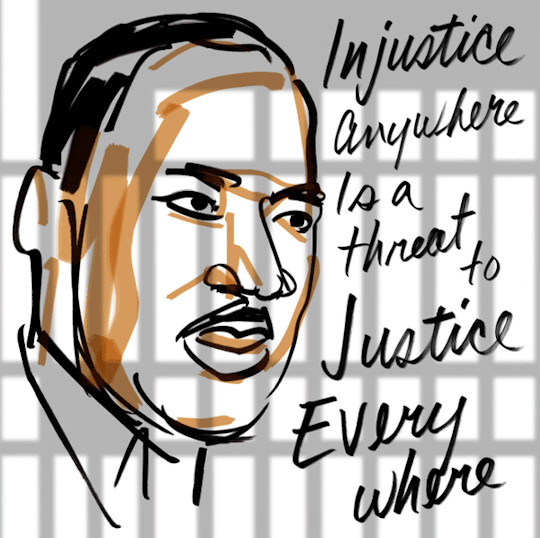



King's Easter epistle on civil disobedience
Fifty years ago, the civil rights leader violated an injunction forbidding him to pray, sing or march in public in Birmingham, Ala.
Upon his arrest, the civil rights leader was initially placed in an unlighted, unfurnished solitary confinement cell, but on Monday he was moved to a better cell and given a copy of the statement from local clergymen, which assailed the "outsiders" who came to Birmingham without cause to "incite hatred and violence" through "extreme measures."
MLK confronted the argument that he was hypocritical in demanding that white leaders obey the Supreme Court's decisions on desegregation while urging civil rights activists to violate laws against demonstrating. Can we pick and choose the laws we obey? Yes, he argued. "There are two types of laws: just and unjust," King wrote. "I would be the first to advocate obeying just laws. One has not only a legal but a moral responsibility to obey just laws. Conversely, one has a moral responsibility to disobey unjust laws."
http://articles.latimes.com/2013/mar/29/opinion/la-oe-oppenheimer-martin-luther-king-letter-from-a-20130326
Civil disobedience is one of the many ways people have rebelled against what they deem to be unfair laws. Thoreau's 1848 essay Civil Disobedience, originally titled "Resistance to Civil Government", has had a wide influence on many later practitioners of civil disobedience. The driving idea behind the essay is that citizens are morally responsible for their support of aggressors, even when such support is required by law. There are several forms of civil disobedience - violent & non-violent, revolutionary & non-revolutionary, and collective & solitary movements.
Satyagraha is but a modified idea that sprung from the more generic theory of ‘civil disobedience’, wherein violence of any kind is completely ruled out and the quest is for the truth. Satyagrahis, or the people who practice satyagraha, aim to eliminate antagonisms without harming the antagonists themselves, as opposed to violent resistance, which is meant to cause harm to the antagonist. A Satyagrahi therefore does not seek to end or destroy the relationship with the antagonist, but instead seeks to transform or “purify” it to a higher level. In other words, here, the ends and the means are inseparable. The means are just as important as the ends are. The famous ‘Salt March’ of 1930 by Mahatma Gandhi is a perfect example of the Satyagraha movement.
https://www.quora.com/What-is-Civil-Disobedience-and-why-is-it-different-from-Satyagraha
http://izquotes.com/quote/290472
“Along the way of life, someone must have sense enough and morality enough to cut off the chain of hate. This can only be done by projecting the ethic of love to the center of our lives.”
Although Dr. Martin Luther King, Jr. used Christian social ethics and the New Testament concept of “love” heavily in his writings and speeches, he was as influenced by Eastern spiritual traditions, Gandhi’s political writings, Buddhism’s notion of the interconnectedness of all beings, and Ancient Greek philosophy. His enduring ethos, at its core, is nonreligious — rather, it champions a set of moral, spiritual, and civic responsibilities that fortify our humanity, individually and collectively.
In the first of the six basic philosophies, Dr. King addresses the tendency to mistake nonviolence for passivity, pointing out that it is a form not of cowardice but of courage:
“It must be emphasized that nonviolent resistance is not a method for cowards; it does resist. If one uses this method because he is afraid or merely because he lacks the instruments of violence, he is not truly nonviolent. This is why Gandhi often said that if cowardice is the only alternative to violence, it is better to fight… The way of nonviolent resistance … is ultimately the way of the strong man. It is not a method of stagnant passivity… For while the nonviolent resister is passive in the sense that he is not physically aggressive toward his opponent, his mind and his emotions are always active, constantly seeking to persuade his opponent that he is wrong. The method is passive physically but strongly active spiritually. It is not passive non-resistance to evil, it is active nonviolent resistance to evil.”
He turns to the second tenet of nonviolence:
“Nonviolence … does not seek to defeat or humiliate the opponent, but to win his friendship and understanding. The nonviolent resister must often express his protest through noncooperation or boycotts, but he realizes that these are not ends themselves; they are merely means to awaken a sense of moral shame in the opponent. The end is redemption and reconciliation. The aftermath of nonviolence is the creation of the beloved community, while the aftermath of violence is tragic bitterness.”
https://www.brainpickings.org/2015/07/01/martin-luther-king-jr-an-experiment-in-love/
0 notes